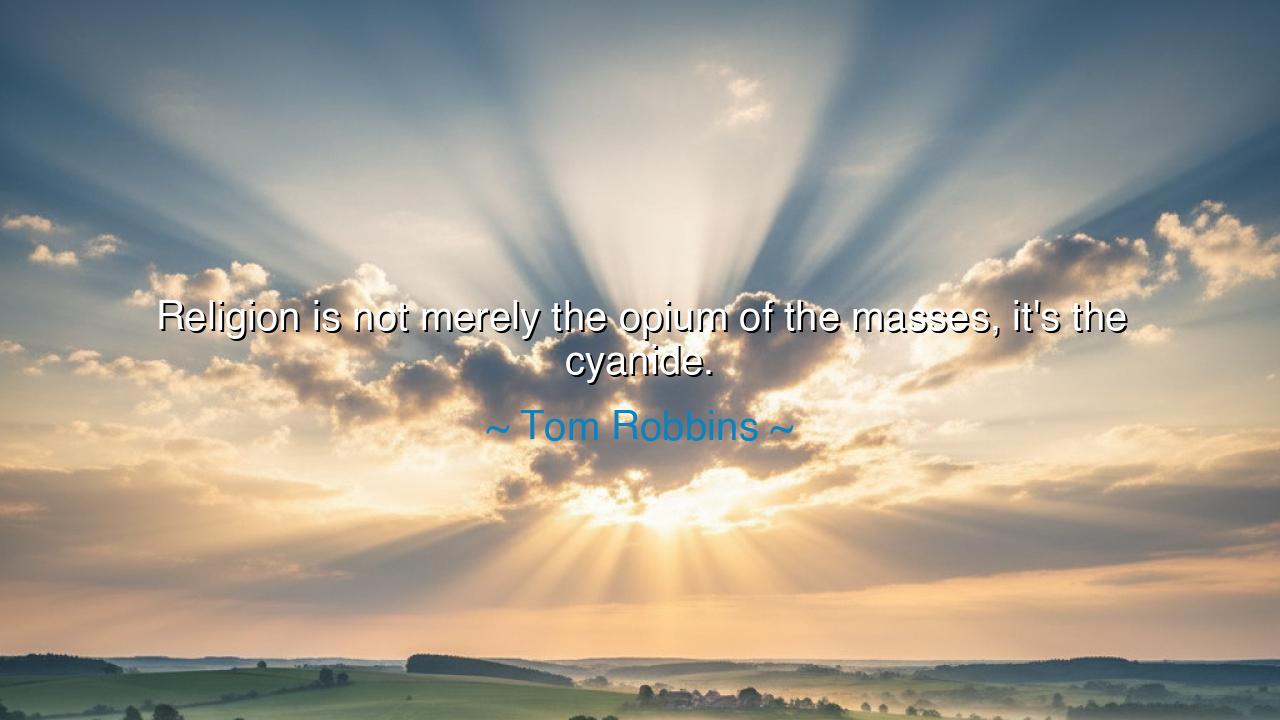
Religion is not merely the opium of the masses, it's the cyanide.






"Religion is not merely the opium of the masses, it's the cyanide." These words, spoken by the sharp-witted Tom Robbins, cut to the heart of a much-debated truth, casting a shadow over the age-old assertion that religion is merely a soothing balm for the suffering of the people. No, Robbins suggests—religion is more than an opiate, it is poison, a toxin that not only dulls the senses but, when misused, can destroy the very soul of humanity. In this provocative statement, Robbins does not merely challenge the comfortable views of religion as a source of comfort and meaning, but rather confronts its potential to mislead, to enslave, and to corrupt.
To understand the full weight of this statement, we must first reflect on the origins of religion as a means of control and manipulation. Through the ages, religious institutions have often been wielded not as a source of divine enlightenment, but as a tool for those in power to keep the masses subjugated. The great empires of old—Rome, Egypt, and beyond—understood the power of religion not as a divine gift, but as a means of controlling the hearts and minds of their citizens. What better way to maintain order and ensure obedience than to bind the people’s thoughts to an unseen, omnipotent force? In this sense, religion becomes a form of opium, dulling the senses, numbing the mind, and preventing the people from questioning the structures that oppress them.
But Robbins takes this further. He does not merely see religion as an opiate—it is also cyanide, a deadly poison. For when religion is used as a tool for division, hatred, and oppression, it becomes far more destructive than a mere distraction. History is littered with examples of religious zealotry gone astray—crusades fought in the name of God, wars waged over doctrinal differences, persecution of those who dared to believe differently. In these moments, religion ceased to be a guide toward compassion, understanding, and unity. Instead, it became a justification for violence, injustice, and death.
Consider the Inquisition, that dark period in European history when countless men and women were tortured and killed for daring to question the religious orthodoxy of the time. Here, religion was no longer the opiate of the masses—it was the cyanide that poisoned the hearts of those in power and destroyed the lives of the innocent. People were not merely subdued by religion; they were crushed under its weight, forced to conform or face death. The promise of spiritual salvation became a tool of oppression, a poison that tainted the very soul of society.
Yet, even in the modern world, the potential for religion to become cyanide remains. It is easy to point to the fanatical extremists who, in the name of their faith, commit unspeakable atrocities. From the terrorist attacks of today to the genocides of the past, religion has too often been perverted into a weapon of hate. When one group believes that their God demands the destruction of another, the poison of intolerance and violence spreads, infecting societies and leaving scars that endure for generations. It is in these moments, when faith becomes a justification for suffering rather than a source of healing, that religion truly becomes the cyanide Robbins speaks of.
But what, then, are we to do with this powerful force called religion? Is it a necessary poison, or can it be transformed into a force for good? The answer lies not in abandoning religion, but in reclaiming it, in stripping away the corrupt layers that have been added over time and returning to its core teachings of compassion, love, and understanding. Religion, at its best, can still be a source of spiritual nourishment, a means of connecting humanity to the divine and to each other. But it is up to us, as individuals and as a society, to ensure that it does not become a tool for oppression and division.
The lesson Robbins imparts is clear: we must be vigilant, for religion—like all powerful forces—can be both a healing balm and a deadly poison. It is up to each of us to ensure that religion remains a force for good, that it uplifts rather than destroys, that it promotes peace rather than violence. We must question the ways in which religion is used to manipulate, divide, and oppress, and instead, embrace its true purpose: to bring us closer to each other and to the divine. In doing so, we transform religion from cyanide into a powerful force for love, justice, and freedom.






AAdministratorAdministrator
Welcome, honored guests. Please leave a comment, we will respond soon